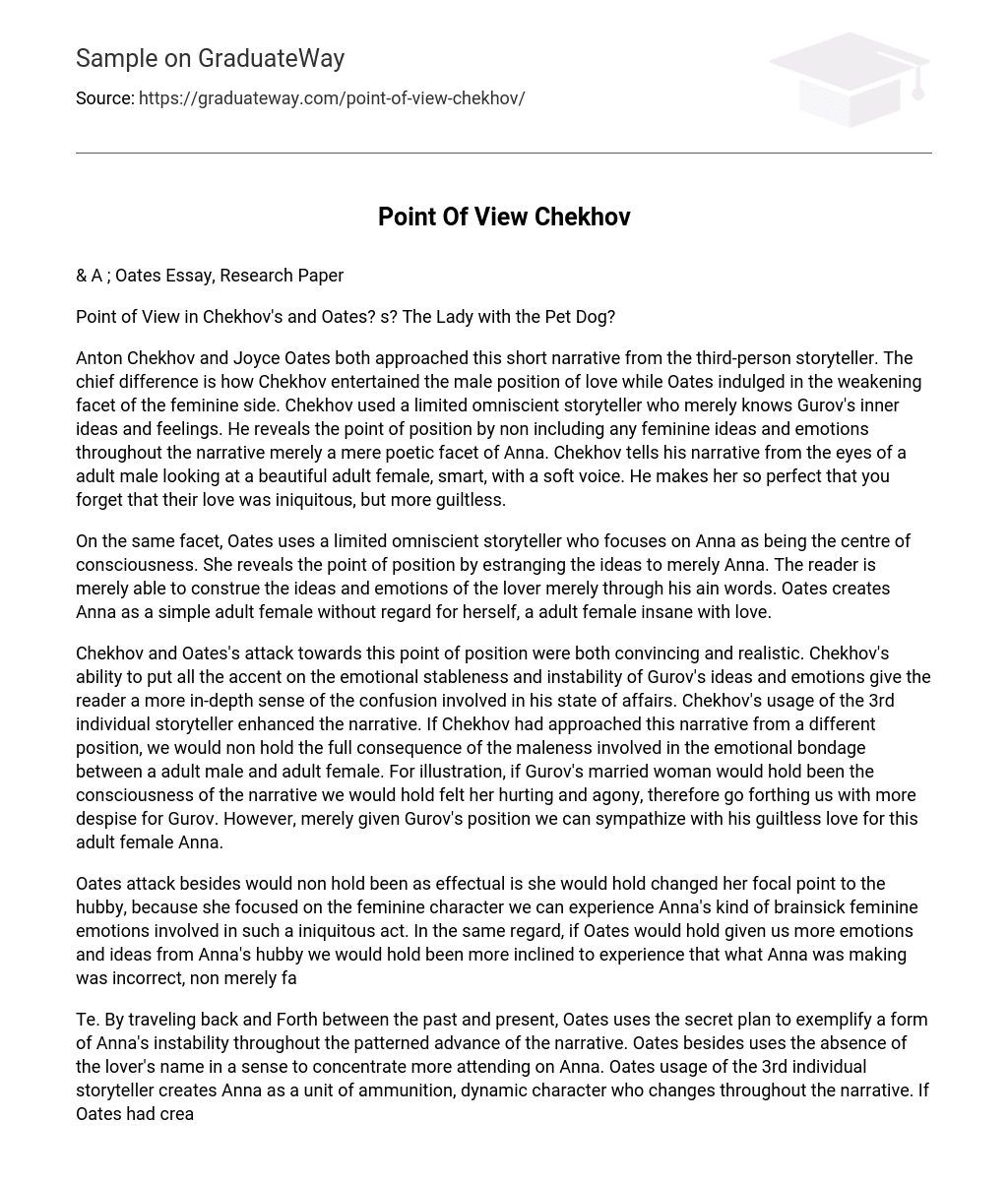Anton Chekhov and Joyce Oates both approached this short narrative from the third-person storyteller. The chief difference is how Chekhov entertained the male position of love while Oates indulged in the weakening facet of the feminine side. Chekhov used a limited omniscient storyteller who merely knows Gurov’s inner ideas and feelings. He reveals the point of position by non including any feminine ideas and emotions throughout the narrative merely a mere poetic facet of Anna. Chekhov tells his narrative from the eyes of a adult male looking at a beautiful adult female, smart, with a soft voice. He makes her so perfect that you forget that their love was iniquitous, but more guiltless.
On the same facet, Oates uses a limited omniscient storyteller who focuses on Anna as being the centre of consciousness. She reveals the point of position by estranging the ideas to merely Anna. The reader is merely able to construe the ideas and emotions of the lover merely through his ain words. Oates creates Anna as a simple adult female without regard for herself, a adult female insane with love.
Chekhov and Oates’s attack towards this point of position were both convincing and realistic. Chekhov’s ability to put all the accent on the emotional stableness and instability of Gurov’s ideas and emotions give the reader a more in-depth sense of the confusion involved in his state of affairs. Chekhov’s usage of the 3rd individual storyteller enhanced the narrative. If Chekhov had approached this narrative from a different position, we would non hold the full consequence of the maleness involved in the emotional bondage between a adult male and adult female. For illustration, if Gurov’s married woman would hold been the consciousness of the narrative we would hold felt her hurting and agony, therefore go forthing us with more despise for Gurov. However, merely given Gurov’s position we can sympathize with his guiltless love for this adult female Anna.
Oates attack besides would non hold been as effectual is she would hold changed her focal point to the hubby, because she focused on the feminine character we can experience Anna’s kind of brainsick feminine emotions involved in such a iniquitous act. In the same regard, if Oates would hold given us more emotions and ideas from Anna’s hubby we would hold been more inclined to experience that what Anna was making was incorrect, non merely fa
Te. By traveling back and Forth between the past and present, Oates uses the secret plan to exemplify a form of Anna’s instability throughout the patterned advance of the narrative. Oates besides uses the absence of the lover’s name in a sense to concentrate more attending on Anna. Oates usage of the 3rd individual storyteller creates Anna as a unit of ammunition, dynamic character who changes throughout the narrative. If Oates had created this narrative utilizing an all-knowing storyteller, we would hold the ability to cognize all and so our sentiments on the act of unfaithfulness may hold differed. If Oates would hold put more ideas and emotions on other character in the narrative so the narrative may hold unfolded otherwise. Imagine the narrative being told from the hubbies position he would likely be full of choler and hatred, but this narrative is more full of love than hatred. Possibly, if the reader knew the hubby ideas and experiencing about Anna, either good or bad, the narrative may hold taken a different bend. However, go forthing all of the other characters ideas out, we can merely assume that she was moving in destiny. Not being able to see the response of certain state of affairss leaves the reader to be sympathetic towards such an irrational, unstable character such as Anna.
In comparing, Chekhov’s usage of names is to qualify Anna and Gurov and give a more personal attack in understanding the world of more than one character versus Oates attack at merely giving a name to the chief character Anna which leaves the reader more at stray about the world of the lover. Oates uses this attack to indulge our senses in how Anna felt ; non including a name merely makes the reader more unaware of the personal connexion between the two. In add-on, the usage of the limited omniscient storyteller non cognizing the interior lives of the other characters in these narratives plays an of import function in understanding each of the different positions. If the reader is given the chance to see the interior lives of other characters, we may hold felt otherwise toward each of the chief characters in these narratives.
In decision, the two narratives of? The Lady with the Pet Dog? have parallel points of position. Other than the differences mentioned above. These narratives create an emotional apprehension of the pragmatism of life. Both of these writers did a fantastic occupation making a sense of actuality from the different positions, masculine and feminine.





